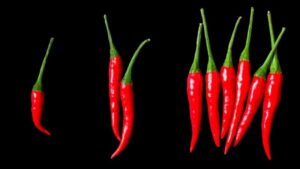Why can your friend swallow jalapeños like candy while you weep from just a sprinkle of black pepper? If you’ve ever wondered whether
The ability to handle fiery food without flinching seems almost superhuman to those cursed with ultra-sensitive taste buds. But the answer to whether we’re born
In this article, we’ll explore how genetics, receptors, hormones, and environmental exposures all interact to determine your tolerance. While specific factors like saliva and gender play a role, science shows that, for most of us, a taste for
By gradually exposing your tongue, even wimps can adapt to enjoy hotter chilies through acquired taste. Of course, respecting your limits is key, since not everyone is cut out to feast on scorpion peppers. Ready to unlock the secrets of your
Why Do Some People Love Painful Spices?
First, let’s step back. Why do some folks willingly subject themselves to the fiery sensations of chili peppers and other painfully hot spices?
It may seem masochistic. But there’s actually some fascinating biology at play.
When you eat spicy food, it triggers pain receptors on your tongue called TRPV1. This sends signals to your brain, making you literally feel like your mouth is burning.
In response, your brain releases feel-good endorphins and dopamine to counteract the pain. For
This thrill-seeking effect helps explain the rising popularity of ultra-hot peppers. But it doesn’t account for why
The Blazing Biology of Spicy Sensations
The key to spiciness lies in capsaicin, the chemical compound in chilies that ignites TRPV1 receptors. But not everyone’s receptors perceive capsaicin equally.
Here are some biological factors influencing
- Genetic variations in TRPV1 receptors mean some people detect capsaicin more readily.
- Gender – Studies show men tend to tolerate spicy food better, for hormonal reasons.
- Differences in saliva composition and taste bud density also impact
spice perception. - The neurotransmitter substance P plays a role in transmitting capsaicin’s burning signals to the brain.
So in theory, genetic differences could make some people much more sensitive to capsaicin than others. But it’s not the whole story…
Is Spicy Food an Acquired Taste?
While genetics play a part, research shows tolerance is largely driven by environmental factors.
Here’s how getting accustomed to
- Repeated capsaicin exposure makes nerves less sensitive over time through a process called desensitization.
- As substance P becomes depleted, signals about the spiciness decrease.
- The more rounds of
spice you endure, the higher your tolerance climbs. - Taste buds adapt to detect flavor notes beyond just heat.
This explains why cultures with spicy cuisines tend to have higher tolerances. Over time, their tongues have literally adapted!
For individuals, seeking spicy thrills can also raise your tolerance through acquired taste.
Using Taste Bud Training to Handle the Heat
Don’t resign yourself to a mild palate just yet. With strategic taste bud training, even
Here are tips to build your tolerance:
- Start slow – don’t jump straight to habaneros! Instead, gradually increase from jalapeños to cayenne.
- Pair spicy food with cooling elements like yogurt or lime juice. This balances the burn.
- Focus on flavor, not just heat. Allow your tastebuds to detect nuances as you acclimate.
- Push your limits occasionally. Mild discomfort followed by endorphins will raise your threshold.
- Stay hydrated and limit alcohol, which amplifies
spice perception.
With patience and technique, you can condition your tongue for more scorching spices!
Why Some Just Can’t Handle The Burn
For those who struggle with even black pepper, an abnormally acute sense of capsaicin may be to blame.
Factors like chronic sinus issues, gastrointestinal diseases, or sensory processing disorders can all heighten sensitivity to spices. The key is working within your limits.
While masochistic chili heads may chase endless tongue torment, don’t feel pressured if that’s not your speed. There are plenty of flavorful
Spice Tolerance Decoded: Born vs. Made
The verdict? While genetics do play some role, research shows that
With strategic tasting, even wimpy tongues can adapt to more heat through acquired taste. But ultra-sensitivity likely has a biological basis.
The beauty of food science is that there’s room for all palates! Whether you’re a cool cucumber or flaming hot pepper, embrace the flavors that make you happiest.
Frequently Asked Questions About Spice Tolerance
Still wondering if you were born with a taste for
Is spice tolerance genetic?
It’s complicated. Genetic factors like differences in receptors, hormones, and saliva do influence perception of spiciness. But research suggests tolerance is primarily driven by environmental exposures over time.
Why can some people handle spicy food?
Frequent exposure to capsaicin can desensitize nerve receptors over time, increasing tolerance. Biological factors like gender, receptor density, and saliva composition also play a role.
Do you build a tolerance to spicy food?
Absolutely. Studies show tolerance increases with repeated exposure as nerves become desensitized to capsaicin. Even
Why do I hate spice but my sibling loves it?
Minor genetic differences may be at play. But more likely, your sibling has simply eaten more spicy food over time, gradually increasing their tolerance through acquired taste.
Does ethnicity determine spice tolerance?
To some degree, yes. Populations like those in India and Mexico that frequently consume hot peppers have higher average tolerances. Over generations, cultural exposure shapes biological adaptation.
Feel the Spicy Burn? It’s Mostly Nurture, Not Nature
While individuals vary, the latest research suggests
By gradually increasing doses, even





